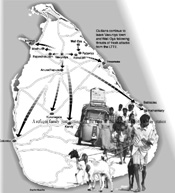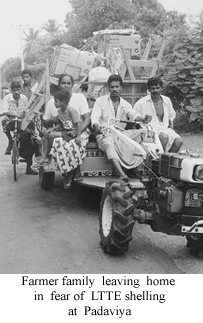The Special Assignment 2
14th November 1999
In fear they flee
By Leon Berenger & Chris Kamalendran
Front Page|
News/Comment|
Plus| Business| Sports|
Sports Plus| Mirror Magazine

![]()
A threat of LTTE attack has triggered off a tragic human exodus-one from Vavuniya the other from Welioya
 They
were leaving in their thousands, men, women and children of all communities
as the sounds of war got closer and closer to their backyards.
They
were leaving in their thousands, men, women and children of all communities
as the sounds of war got closer and closer to their backyards.
The exodus of people was on in two fronts, one in the northern district of Vavuniya and the other on the eastern flank of Welioya.
It all began on Wednesday, shortly after the clandestine LTTE radio hinted in an announcement that Vavuniya was no longer safe as it had come within the range of Tiger artillery fire and urged civilians to leave.
Although the Voice of the Tigers radio stopped short of saying it planned to attack the town, the warning itself was enough to trigger a mass exodus, the first in eight years.
Hundreds of families -Sinhalese, Tamil and Muslims were soon on the road clutching whatever possessions they could lay their hands on and were heading to other parts of the country.
The most affected in this latest crisis are the Tamils who make up nearly 85 per cent of the estimated 200,000 population in the Vavuniya district.
A majority of them fled to Tamil-dominated areas of Mannar and Chettikulam, while others sought refuge with relatives and friends in the eastern cities of Trincomalee, Batticoloa and Kattankudy and in places such as Nuwara Eliya, Kandy and Matale in the central hills.
Police and security forces did not move to stop the exodus for fear of being accused of using civilians, mainly Tamils as a human shield. "Everybody who had a valid pass was free to leave and go whereever they wanted to. No one stopped them in any way whatsoever," a woman police constable (WPC) manning a check point on the outskirts of Vavuniya said. Some of the traders returned the next day to remove goods from their shops fearing the outbreak of looting that could occur as the situation deteriorates with the breakdown of the civil administration in the district.
The situation has already led to the closure of all schools, government departments and other institutions, banks, both private and state and even the government hospital in the heart of the town.
Recognised firms, like Cocoa Cola and Pepsi hurriedly sent in their top executives to clear the shelves of valuable items from their outlets before they fell into the wrong hands.
There were those who were also there to make a quick buck at the expense of another's misery. As thousands of people were desperately trying to flee the town in whatever available transport, some van operators were charging huge fees like Rs. 7,500 for the 15-mile trip from Vavuniya to Medawachiya. The normal rate is not more than Rs. 2000.
Those who have not left are those who have little option since they are refugees from earlier fighting and cannot travel out of the district since they do not have the relevant travel papers sanctioned by the military authorities.
Unlike the permanent residents of Vavuniya who have been issued with an identity card by the authorities, the refugees have been given a 'day pass' valid for 24 hours which cannot be used for travel anywhere outside the district.
These desperate people are caught between the devil and the deep blue sea. There are fears they might turn to looting and other illegal activities as the food situation turns too bad since shipments of essentials to the district have come to a virtual standstill because of the prevailing uncertainity.
K. Balasunduram who was displaced during earlier fighting at Kilinochchi is now trapped in a refugee camp at Punthotam in Vavuniya. On Friday he had gone to town along with others to buy whatever provisions possible with the meagre Rs 30 given to them by the authorities for their daily expenses. But nothing could be bought since most traders had put down their shutters. Balasunduram and others like him have little option but live in hope that aid agencies would role in as soon as possible.
The scene that greets one at the Vavuniya hospital is pathetic. Hospital authorities together with Medicin Sans Frontiers (MSF) transferred the 137 indoor patients to Chettikulam hospital as fear and tension mounted in the region. Now there are only four doctors from the original 34. These four doctors are willing to brave whatever danger for the sake of the poor and sick and together they are providing a skeleton service to the patients who still turn up at the hospital.
"These people cannot be turned away, somebody has to care for them", one doctor who did not want to be named told The Sunday Times.The problem he said would be when the hospital runs out of drugs and medicine. "It is likely that it will take some time for the new shipments to arrive, which will only be after the present crisis is defused," he said
There are also those people who do not want to leave their homes fearing they could be looted. Ransanjani(not her real name) a housewife is one such person who is willing to take the risk and stay on. She is convinced the LTTE would not strike, since it will only harm Tamil interests.
Among those opting to stay back is a local Tamil journalist who is reluctant to leave his home."Identitiy checks, routine cordon and search operations and the likes in the southern cities always gives me the jitters. I do not like to face such situations, and so 'come what may' I have decided to stay at home, artillery shells or otherwise," he said.
Meanwhile some 75 miles east, at Welioya, thousands of men, women and children are running for their lives hours after Tiger artillery landed dangerously close to their farm abodes.
The only difference here is that the refugees are mainly Sinhala people .The LTTE say these people are settlers in traditional Tamil homelands and have no right to live and farm in the region and so they scared them off with deadly artillery warnings and soon the villages of Janakapura, Gajabapura were empty of its inhabitants.
The situation has already created nearly 6,000 refugees who have been given shelter at nine government schools at Padaviya. This figure would double if the situation worsens, warned the Divisional Secretary for Padaviya Ananda Gunawardene.
However what he fears most is the GCE O/L Examination that is scheduled for the first week of next month.
Apart from the schools there are no spacious government buildings in the region and housing the displaced would turn out to be a big headache since the classrooms will be needed for the children sitting the examinations, Mr. Gunawardene said.
At the Padaviya Mahasen Vidayala the refugees informed us that they were being adequately fed and clothed but were anxious for their abandoned homes and their bleak future.
One elderly man recalled how together with other relatives he was forced to bury a fellow villager who had died due to ill-health the previous day minus a coffin as LTTE shells were crashing all around. The body had to be buried in a fresh grave that contained a week-old corpse, he lamented.
"It was the most disrespectful thing I had ever done in my life, but we had little option," Wijetunge Podiappuhamay, a 62-year-old farmer from the village of Nikawewa close to Welioya said.
"What scared the devil out of us were the huge craters that emerged following the explosion of the artillery shells. Huge trees had been uprooted and the area looked as if it was hit by an air raid," another said.
"During the last 16 years we have faced constant LTTE attacks, even atrocities such as the massacre of helpless civilians, but this new threat is frightening. Therefore the only next best thing for us was to move out with our families hoping the situation would return to normal as soon as possible," H.M. Mudiyanse from Monarawewa said.
In addition to their woes most of the civilians affected in the Welioya region had earlier moved out from their traditional villages in other parts of the country to set up successful farmlands in the area.
"Most of our children were born here, this is where our second generation grew up and now we have to move out leaving everything we achieved because of the horrors of war," lamented Chandrasekera Lalitha who fled the village of Janakapura along with her husband and three children.
"It took us two days to cover the 15-mile trip from our village to this school by foot, too scared to turn back and weary to go on. We looked like cattle on the move. I will go back with my family, but only once the LTTE guns are silenced", Lalitha said.
If there's one thing these displaced people from different communities have in common it is that they are the pawns of a long and bloody protracted war and are fleeing from the same tormentor.
Not all is bleak says her smile
Amidst the gloom of uncertainty and war there were still a few smiles and cheers, and this too among the security forces and police along the road to Vavuniya.
 While
fresh reinforcements heading for the front in trucks and buses were clapping
to baila tunes, the smartly clad women police officers could be seen at
bus stops and check points waiting to hitch a ride into Vavuniya town where
they have to report for duty.
While
fresh reinforcements heading for the front in trucks and buses were clapping
to baila tunes, the smartly clad women police officers could be seen at
bus stops and check points waiting to hitch a ride into Vavuniya town where
they have to report for duty.
(Censored)
As the civilians fled (censored) leaving the future of the city to the police and security forces a few light humoured jokes shared among the rank and file irrespective of the uniform shades is indeed a sign that the morale among them is not lost as some would suggest.
(Censored)
Whatever may be said, these women officers some of them probably mothers, have stuck to their positions.
In trains they flock to the city
 While
an estimated 10,000 Tamil refugees who fled Vavuniya have entered the Colombo
city, some are seeking shelter with relatives and friends, and those who
can afford it are staying at various lodgings.
While
an estimated 10,000 Tamil refugees who fled Vavuniya have entered the Colombo
city, some are seeking shelter with relatives and friends, and those who
can afford it are staying at various lodgings.
Many of the refugees including men, women, children and the elderly arrived in packed trains from Vavuniya on Thursday and Friday and headed straight for the refugee shelter centres.There were also those who hired private vehicles to make the long trip.
Their presence is treated with some suspicion by city dwellers who fear there could be rebel infiltrators among them.
These people who were able to make the trip to Colombo, are no doubt the more affluent people, such as traders and government officials who were able to pay the fare for the long trip to the capital.
Officials in the city were making arrangements to feed these displaced persons till some solution could be found to ease their plight.
It was not immediately known as to what security measures would be taken to screen these refugees.








![]()
Front Page| News/Comment| Editorial/Opinion| Plus| Business| Sports| Sports Plus| Mirror Magazine
Please send your comments and suggestions on this web site to

